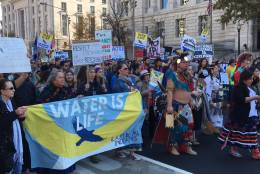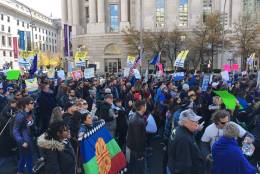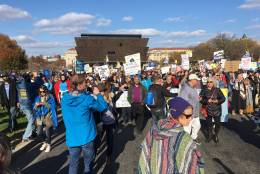




#noDAPL Protest march from Justice Dept to Washington monument. @ WTOP pic.twitter.com/ca6Evmzpe9
— Liz Anderson (@PlanetNoun) November 27, 2016






WASHINGTON — Months of protests over plans to build a $3.8 billion oil pipeline through four states, including North Dakota, prompted a local march from outside the Justice Department to the Washington Monument.
Sunday afternoon’s slow-moving march began in front of the Justice Department. Marchers gathered there to protest the Dakota Access Pipeline. Activists fighting the project in North Dakota said the pipeline threatened cultural sites of the Standing Rock Sioux tribe. Protesters also said the pipeline threatened drinking water and cultural sites on the nearby reservation.
“I think we have to realize how precious water is in the West, and the idea of putting it at risk for another oil pipeline is a bad idea,” said David Hiles of Austin, Texas.
But some said water wasn’t the only issue at play.
“They want you to believe out here that this is a fight only for Native American’s rights to clean water. It’s so much more explosive than that,” Chase Iron Eyes told the crowd gathered at the Sylvan Theater after the march.
He was raised on the Standing Rock reservation, and founded the website Last Real Indians.
“This is the human spirit,” he continued over cheers, “the collective of humanity coming together, because they’re coming for us right now, but they’re coming for your constitutional rights in this process.”
Marchers said they decided to gather for many reasons. Jenny Reinhardt of Hyattsville, Maryland spoke out against the treatment of protesters, who were injured as officers deployed tear gas, rubber bullets and sprayed large, high pressure water hoses against protesters at Standing Rock.
“That’s just not acceptable in America in 2016,” Reinhardt told WTOP along the march route.
Her sister, Leslie Reinhardt, said immediate changes were necessary.
“I think the administration needs to make some kind of move to settle this thing,
Leslie Reinhardt said. “We don’t want it dragging on into the winter in North Dakota.
Others joined the crowd near the Washington Monument. They said they saw a link between social justice movements, such the rights of indigenous people, and concerns regarding the environment and the militarization of police.
“There’s a big tie between the environmental movement and the social justice movement, as far as rights for all people and not just some people,” said Ryan Dreelin of Manassas, Virginia.
The Associated Press contributed to this report.




